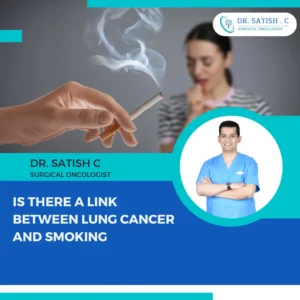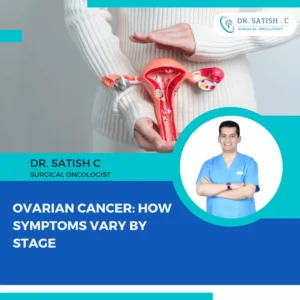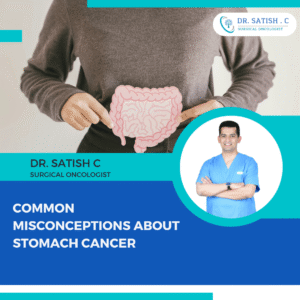Breast cancer and ovarian cancer are two distinct types of cancer, but studies show a strong breast cancer and ovarian cancer link, particularly in individuals with certain genetic mutations. In his video, Dr. Satish C, Cancer Surgeon, explains the hereditary factors behind these cancers and the importance of genetic testing for cancer.
Understanding the Genetic Link
The connection between breast and ovarian cancers primarily comes from inherited mutations in the BRCA gene (BRCA1 and BRCA2). Women with these mutations face a significantly higher risk of developing both breast and ovarian cancers.
- BRCA1 mutation: 39%–58% lifetime risk of ovarian cancer and over 60% risk of breast cancer.
- BRCA2 mutation: 13%–29% risk of ovarian cancer and around 45% risk of breast cancer.
These genetic changes reduce the body’s ability to repair DNA damage, leading to a higher chance of cancer development. Therefore, early detection of cancer through proper screening becomes crucial, especially if there’s a family history of these diseases.
Dr. Satish C’s Expert Insights
In his discussion, Dr. Satish C emphasizes the role of genetic testing for cancer and family history assessment. He highlights how individuals with BRCA mutations can take proactive steps through preventive cancer care, including regular screenings, preventive surgeries, and lifestyle interventions.
Preventive Measures and Screening
For individuals at high risk due to family history or genetic predisposition, the following measures can help reduce cancer risk:
- Genetic Counseling and Testing: Identify BRCA and other related gene mutations.
- Regular Screenings: Mammograms, ultrasounds, and pelvic exams tailored to risk levels.
- Preventive Surgeries: Prophylactic mastectomy or oophorectomy to reduce cancer risk.
- Chemoprevention: Medications to lower cancer risk in high-risk individuals.
Dr. Satish C, cancer surgeon in Bangalore, stresses that personalized care plans considering genetics, family history, and lifestyle factors are key to effective cancer prevention.
Frequently Asked Questions (FAQs)
- What is the BRCA gene mutation, and why is it important?
BRCA1 and BRCA2 genes help repair damaged DNA. Mutations increase the risk of breast cancer and ovarian cancer. - How can I know if I carry a BRCA mutation?
Genetic testing for cancer can identify BRCA mutations. A consultation with a cancer specialist or genetic counselor is recommended. - Who should undergo genetic testing for cancer?
People with a family history of breast or ovarian cancer, or those with early-onset cases in their family, should consider testing. - What steps can be taken if I test positive for a BRCA mutation?
Options include preventive cancer care like surgery, regular screenings, and lifestyle adjustments to reduce risk. - Can lifestyle changes help reduce the risk of breast and ovarian cancers?
While diet, exercise, and reducing alcohol intake can lower risk, genetic mutations still play a significant role, so screening and preventive measures are essential.
Conclusion
Understanding the breast cancer and ovarian cancer link is vital for individuals with a family history of these diseases. Dr. Satish C, a trusted Surgical Oncologist, advocates genetic testing for cancer and early detection strategies to reduce risk and ensure timely treatment.
By staying proactive and informed, individuals can take steps toward preventive cancer care and improve long-term outcomes.




